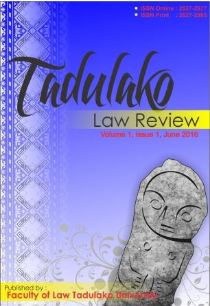LEGAL LIABILITY OF FAST FASHION FOR TEXTILE WASTE MANAGEMENT BASED ON THE PRINCIPLE OF EXTENDED PRODUCER RESPONSIBILITY (EPR)
Keywords:
Key words: Environmental law, fast fashion industry, EPR principlesAbstract
The fast fashion industry is loved by many people, especially young people (Gen Z) who like to shop in a short period of time with a large amount. However, not many people know that fast fashion is not only harmful and polluting the environment but also harmful to its users for a long period of use. This research focuses on the impact of environmental pollution from the disposal of chemical textile waste, including its effect on human health and also on the current regulations in Indonesia. The method used by the researcher is the normative juridical method. SIPSN (National Waste Management and Information System) issued data related to fast fashion industry waste in Indonesia showing a figure of 2.3 million tons / year 2021 and only 0.3 million tons of 2.3 million tons can be recycled, and 80% of other textile waste is in landfills.
References
Journal articles:
A Lukmanul Hakim, Emmy Yuniarti Rusadi. (2022). "Criticism of Globalization: The Phenomenon of Fast Fashion as a Culture of Consumerism among the Youth of Surabaya". AL MA' ARIEF: JOURNAL OF SOCIAL AND CULTURAL EDUCATION, 4(2): 60
Dkk, Made Wipra Pratistita. “Penegakan Hukum Terhadap Pencemaran Limbah Pewarna Cair Industri Tekstil”.” TERANG : Jurnal Kajian Ilmu Sosial, Politik Dan Hukum 1, no. 1 (2024): 281.
Fenty Yolanda Pratiwi, Ibnu Zulian. (2023). "The Trend of Consumerism and the Impact of Fast Fashion on the Environment of Medan City". ACCELERATION: National Scientific Journal, 5(3): 109
Kornelis, Yudi. “Fenomena Industri Fast Fashion: Kajian Hukum Perspektif Kekayaan Intelektual Indonesia".” E-Journal Komunikasi Yustisia Universitas Pendidikan Ganesha 5, no. 1 (2022): 263.
Lukmanul Hakim, A, and Emmy Yuniarti Rusadi. “Kritik Globalisasi: Fenomena Fast Fashion Sebagai Budaya Konsumerisme Pada Kalangan Pemuda Kota Surabaya".” AL MA’ ARIEF: JURNAL PENDIDIKAN SOSIAL DAN BUDAYA 4, no. 2 (2022): 60.
Pratiwi, Fenty Yolanda, and Ibnu Zulian. “Tren Konsumerisme Dan Dampak Fast Fashion Bagi Lingkungan Kota Medan".” AKSELERASI: Jurnal Ilmiah Nasional 5, no. 3 (2023): 109.
Verawati, Peni. “Kebijakan Extended Producer Responsibility Dalam Penanganan Masalah Sampah Di Indonesia Menuju Masyarakat Zero Waste.” Jurnal Ilmu Hukum Dan Humaniora 9, no. 1 (2022): 190.
Yudi Yusnandi, Widya Krulinasari. “Tinjauan Limbah Kain Sisa Produksi Menurut Hukum Internasional Dan Hukum Nasional.” Seminar Nasional Penelitian Dan Pengabdian Kepada Masyarakat, Universitas Sang Bumi Ruwa Jurai 62–63 (2022).
World Wide Web:
Implementasi EPR (Extended Producer Responsibility) di Indonesia: Peluang dan Tantangan. (2023). Available from: https://info3r.menlhk.go.id/berita/detail/berita-15-v_berita (accessed 20 January 2025)
Fast Fashion Waste in Indonesia: A Hidden Threat to the Environment. 2024. Available from: https://www.netralnews.com/limbah-fast-fashion-di-indonesia-ancaman-tersembunyi-bagi-lingkungan/U0pEdVVYcnI2bnhETnVKdDBqZmQ3dz09 (accssed 28 January, 2025)
Exploring the Implementation of EPR in Indonesia. 2024. Available from: https://aliansizerowaste.id/2022/12/12/mengulik-penerapan-epr-di-indonesia/ (accssed 29 Jananuary, 2025)
We need Extended Producer Responsibility (EPR) policy for textiles. (2024). Available from: https://www.ellenmacarthurfoundation.org/epr-policy-for-textiles (accessed 19 January, 2025)






